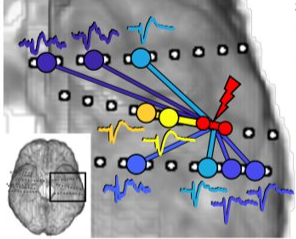Bio
“Expanding the Utility of Brain Stimulation to Delineate Seizure Networks”

Dr. Joon Y. Kang is an assistant professor of neurology at Johns Hopkins School of Medicine with expertise in epileptology and clinical neurophysiology. Dr. Kang’s clinical and research focus is on expanding the current presurgical evaluation to optimize treatment outcomes in patients with drug resistant epilepsy. Dr. Kang has published extensively on the use of magnetic resonance imaging guided laser interstitial thermal therapy for mesial temporal lobe epilepsy and use of direct cortical stimulation to map networks responsible for seizure onset and propagation.
To join the live event please request the link by emailing: icm@jhu.edu
 Recording
Recording
Abstract
“Expanding the Utility of Brain Stimulation to Delineate Seizure Networks”

Brain stimulation is traditionally viewed as a tool to map functional areas in patients undergoing intracranial monitoring. In the past few years, there has been increasing research interest in applying brain stimulation to improve seizure freedom outcomes after epilepsy surgery. However, there is no clear consensus on how stimulation should be performed and lingering questions about the precise additional contribution that stimulation provides to the surgical plan over spontaneous seizures. Our research demonstrates that application of computational analysis methods can provide answers to these questions and can be a powerful tool to improve surgical outcome. In this talk, I will provide a brief clinical background on drug resistant epilepsy and treatments, history and types of brain stimulation and our collaborative research utilizing single pulse electrical stimulation (SPES) to delineate seizure networks with goal of better identifying the targets for epilepsy surgery.
 Recording
Recording